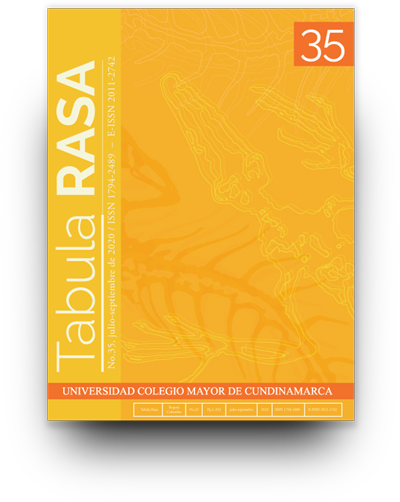The New World Group and the epistemic decolonialization.
El New World Group y la descolonización epistémica.
Show authors biography
The New World Group was a mostly Afro-Caribbean scholarly network that operated during the 60s across the Anglophone Caribbean, led by thinkers and activists, such as Lloyd Best, James Millette, George Beckford and Norman Girvan. It had ramifications in other regions of the Caribbean and Canada and the United States. Its members emphasized the need for epistemic decolonization in the study of their own historical realities and traditions in order to deepen the processes of independence that developed in their regions. In this spirit, they developed concepts such as «independent thought» and «mental decolonization». Their contributions in the field of decolonial social sciences in the region are remarkable, anticipating contemporary stances in postcolonial and decolonial studies for several decades.
Article visits 93 | PDF visits 87
Downloads
- Austin, D. (2014). Miedo a una nación negra: raza, sexo y seguridad en el Montreal de los años sesenta. La Habana: Casa de las Américas.
- Beckford, G. (1972). Persistent Poverty. Underdevelopment in Plantation Economies of the Third World. London: Oxford University Press.
- Best, Ll. (2017) [1967]. Pensamiento independiente y libertad caribeña. En F. Valdés (Coord.). Antología del pensamiento crítico caribeño contemporáneo. West Indies, Antillas francesas y Antillas holandesas, (pp. 431-458) Buenos Aires: Clacso.
- Best, Ll. (2010). A Caribbean Life. En B. Meeks, & N. Girvan. (Eds.) The Thought of New World. The Quest for Decolonisation, (pp. 221-328). Kingston: Ian Randle.
- Best, Ll. (1993). The Contribution of George Beckford, Social and Economic Studies, 41(3), 5-23.
- Best, Ll. (1968). An Outline Model of Pure Plantation Economy, Social and Economic Studies, 17(3)283-326.
- Best, Ll. & Polanyi Levitt, K. (2008). Teoría de la economía de plantación. La Habana: Casa de las Américas.
- Blyden, E. (1994) [1887]. Christianity, Islam and the Negro Race. Baltimore: Black Classic Press.
- Bogues, A. (2014). The Abeng Newspaper and the Radical Politics of Postcolonial Blackness. En K. Quinn (Ed.). Black Power in the Caribbean, (pp. 76-96). Gainesville: University Press of Florida.
- Bogues, A. (2003). Lloyd Best and the Politics of Epistemic Decolonization. En S. Ryan (Ed.). Independent Thought and Caribbean Freedom: Essays in Honour of Lloyd Best, St. Augustin, Trinidad: University of the West Indies.
- Césaire, A. (1969) [1939]. Cuaderno de retorno a un país natal, México: Era.
- Cipriani, A. E. (1940). Twenty-five Years After: The British West Indies Regiment in the Great War, 1914-1918. Puerto España: Trinidad Publishing Company.
- De Caires, D. (2010). Reflections on Intellectuals, the New World Group and Walter Rodney. En B. Meeks & N. Girvan (Eds.). The Thought of New World. The Quest for Decolonisation, (pp. 65-70). Kingston: Ian Randle.
- Demas, W. (1965). Economics of Development in Small Countries: with special references to the Caribbean, Montreal: McGill-Queen’s Press.
- Devés, E. & Estenssoro, F. (2016). El pensamiento sobre asuntos internacionales en el Caribe de habla inglesa. El New World Group y su herencia, Direitos Humanos e Democracia, 7, 24-46.
- Firmin, A. (2011) [1885]. Un acercamiento a la igualdad de las razas humanas. La Habana: Editorial Ciencias Sociales.
- Girvan, N. (2017) [2005]. El pensamiento de la dependencia en el Caribe anglófono. En F. Valdés (Coord.). Antología del pensamiento crítico caribeño contemporáneo: West Indies, Antillas francesas y Antillas holandesas, (pp. 459-498). Buenos Aires: Clacso.
- Girvan, N. (2010). New World and its Critics. En B. Meeks & N. Girvan (Eds.). The Thought of New World. The Quest for Decolonisation, (pp. 3-29). Kingston: Ian Randle.
- Girvan, N. (1977). Aspectos de la economía política de raza en el Caribe y las Américas, Nueva Sociedad, 28, 75-86.
- Girvan, N. (1976). Corporate Imperialism: Conflict and Expropiation. New York: White Plains.
- Grosfoguel, R. (2018). ¿Negros marxistas o marxismos negros?: una mirada decolonial. Tabula Rasa, 28, 11-22. https://doi.org/10.25058/20112742.n28.1
- James, C.L.R. (2014) [1932]. The Life of Captain Cipriani. An Account of British Government in the West Indies. Durham: Duke University Press.
- James, C.L.R. (2003) [1938]. Los jacobinos negros. México: Turner/Fondo de Cultura Económica.
- James, C.L.R. (1962). Party Politics in the West Indies, Puerto España: Vedic Enterprises. Lewis, R. (1988). Marcus Garvey. Paladín anticolonialista. La Habana: Casa de las Américas.
- Meeks, B. (2010). Remembering New World. En B. Meeks & N. Girvan (Eds.). The Thought of New World. The Quest for Decolonisation, (pp. xi-xiii). Kingston: Ian Randle.
- Millette, J. (2010). The New World Group: Historical Perspective. En B. Meeks & N. Girvan (Eds.). The Thought of New World. The Quest for Decolonisation, (pp. 30-64). Kingston: Ian Randle.
- Nkrumah, K. (1966). Neo-colonialismo. Última etapa del imperialismo. México: Siglo XXI.
- Olivier, S. (2018) [1906]. White Capital and Coloured Labour. Ontario: Chizine Publications.
- Payne, A. (1983). The Rodney Riots in Jamaica: The background and significance of the events of October 1968. The Journal of Commonwealth & Comparative Politics, 21(2), 158-174.
- Polanyi Levitt, K. (2010). The Montreal New World Group. En B. Meeks & N. Girvan (Eds.). The Thought of New World. The Quest for Decolonisation, (pp. 71-80). Kingston: Ian Randle.
- Reddock, R. & Jain, S. (1998). Women Plantation Workers. International Experiencies. Oxford: Berg.
- Valdés, F. (2017). La in-disciplina de Caliban. Filosofía en el Caribe más allá de la academia. La Habana: Instituto de Filosofía.
- Williams, E. (2011) [1944]. Capitalismo y esclavitud, Madrid: Traficantes de sueños.
- Williams, E. (2009) [1970]. De Colón a Castro: la historia del Caribe 1492-1969. México: Instituto Mora.
- Williams, E. (1994) [1945]. Education in British West Indies, New York: A & B Publishers.
- Williams, E. (1964). British Historians and the West Indies. Puerto España: PNM Publications.




